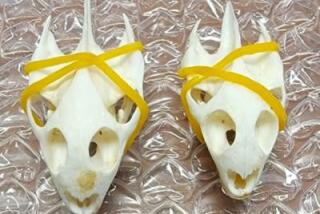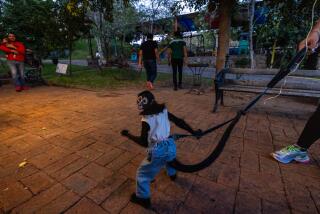Smuggler to Pay for Pocketing Monkeys
Robert John Cusack smuggled a pair of endangered pygmy monkeys into the United States. In his pants.
On June 13, Ho Truong, a U.S. Fish and Wildlife Service special agent, was called to Los Angeles International Airport after Cusack was stopped by U.S. Customs agents on arrival from Thailand.
Officials soon discovered that Cusack, 45, had four endangered birds of paradise and 50 protected orchids with him.
“When one of the inspectors opened up his luggage, one of the birds flew out,” Truong said. “He had to go catch the bird.”
After finding the other purloined birds and exotic flowers, the inspectors asked, “Do you have anything else you should tell us about?”
According to Truong, Cusack answered, “Yes, I’ve got monkeys in my pants.”
They patted Cusack down to check for weapons, then asked for the loris, rare primates native to Vietnam, Laos and Cambodia.
“He had them in a little pouch in his pants,” Truong said. “We’ve had a couple of monkey cases before, but this was the only time where somebody’s stuck monkeys down his pants.”
Assistant U.S. Atty. Joseph Johns said people illegally import “sturgeon -- you know, caviar -- jaguar pelts, sea turtles -- their eggs are very big with the Central American community -- reptiles, including Komodo dragons, elephant tusks, songbirds ... and illegally harvested fish.”
He said the black market in wildlife is the world’s second largest, trailing only narcotics.
This week, Cusack pleaded guilty to smuggling the tiny primates, which are more closely related to lemurs than to monkeys, and was sentenced by U.S. District Judge Terry Hatter in Los Angeles. Cusack had tried to bring the contraband wildlife into the country without proper permits.
Cusack was sentenced to 57 days in jail, time already served.
And under a plea agreement, he was ordered to donate more than $11,500 to a Texas facility for primates and to pay more than $3,000 for the primates’ board while quarantined at the International Center for Gibbon Studies in Santa Clarita.
The big-eyed, stubby-tailed creatures about the size of a furry baseball are now in the nursery at the Los Angeles Zoo.
Cusack told federal agents that he had bought the pair in a market in Indonesia and that he had kept them in his carry-on until four hours or so before the flight was to land. He then decided to move them into his pants.
“His story was that, even though he’s an American citizen, he had moved to Costa Rica, and he claimed that he had a wildlife sanctuary there, and these animals were for his wildlife sanctuary,” Truong said.
Cusack’s lawyer, Dominic Cantalupo of Santa Monica, said his client did not respond to messages Wednesday.
Cantalupo said Cusack lives in Orange County but formerly lived in Palm Springs.
The attorney described him as an environmentalist who “up to the point where he was arrested, lived a law-abiding life and then made an unwise, spontaneous and emotional decision to bring in the animals, birds and plants he was caught with.”
Cantalupo said his client expressed remorse in court on Monday.
“He recognized the foolishness and impulsiveness of what he tried to do,” he said.
Johns said Cusack’s was one of dozens of “critter cases” his environmental crimes section prosecutes every year.
At the zoo, the loris have gained weight on a diet of fruit and vegetables, mealworms and grubs.
The male, which has had some dental work done, will weigh about a pound when fully grown, the female somewhat less, officials said.
“They’re doing really well,” said Jennie McNary, the zoo’s curator of mammals. The animals were 3 or 4 months old when confiscated in June, she said.
She speculated that they survived their stay in Cusack’s pants relatively well “because they’re so small and nocturnal.”
There was no happy ending for the four smuggled birds of paradise. All four have died.
More to Read
Sign up for Essential California
The most important California stories and recommendations in your inbox every morning.
You may occasionally receive promotional content from the Los Angeles Times.










